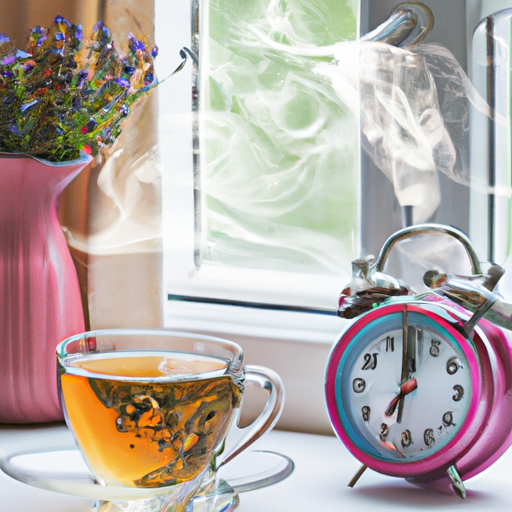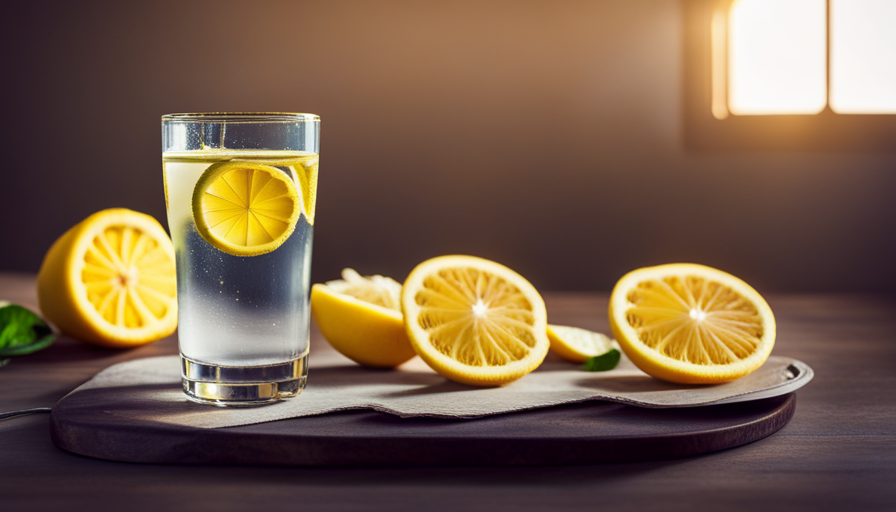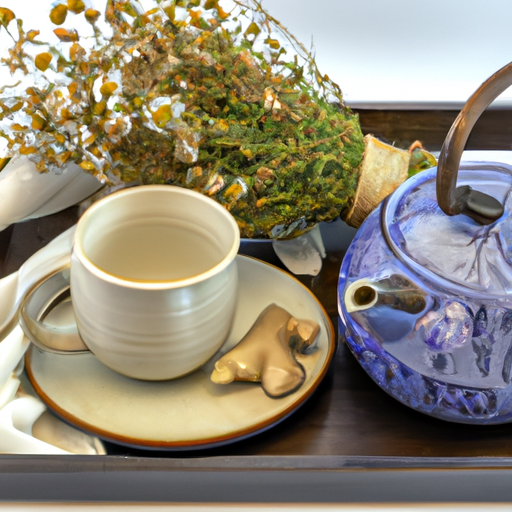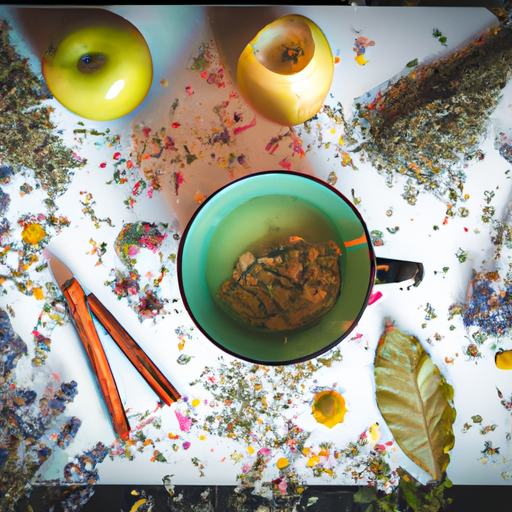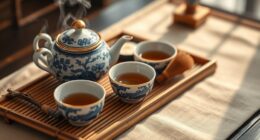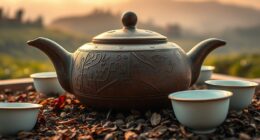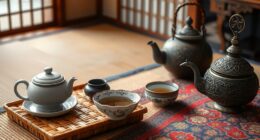When it comes to intermittent fasting, time-restricted eating is a trendy practice. A common question that people have is whether they can enjoy herbal tea for its soothing warmth while fasting.
Like a delicate dance between tradition and discipline, this query invites us to explore the possibilities. Just as a conductor orchestrates a symphony, we seek to harmonize the benefits of herbal tea with the principles of intermittent fasting.
With the potential to enhance hydration, boost metabolism, and promote relaxation, herbal teas offer a tantalizing proposition for those seeking a respite from the rigors of fasting. But can we sip on these flavorful infusions without disrupting the delicate balance of our fasting routine?
Join me as we navigate the realm of intermittent fasting and uncover the truth behind incorporating herbal tea into our fasting journey. Together, we will discover the best herbal teas for fasting, tips for incorporating them into our routine, and ultimately find a balance that aligns with our health goals.
Key Takeaways
- Herbal tea is generally allowed during intermittent fasting and can be consumed during fasting periods.
- Herbal teas like hibiscus, peppermint, and ginger can have additional health benefits such as regulating blood pressure, supporting digestion, and reducing oxidative stress.
- It is important to choose herbal teas that are calorie-free and do not contain additives that can potentially break a fast.
- Personal comfort and satisfaction are crucial in fasting, and incorporating herbal tea can help with satisfaction and variety in the fasting routine.
Understanding Intermittent Fasting
If you’re trying to understand intermittent fasting, it’s important to know that herbal tea is generally allowed during fasting periods.
Intermittent fasting is an eating pattern that cycles between periods of fasting and eating. There are different methods of intermittent fasting, but the most common ones involve fasting for 16-24 hours at a time.
During the fasting period, it is generally recommended to consume only water, black coffee, or herbal tea. Herbal tea is a popular choice because it is calorie-free and can help with hydration.
The science behind intermittent fasting suggests that it can have several health benefits. It has been shown to aid in weight loss by reducing calorie intake and increasing fat burning. It may also improve insulin sensitivity, lower blood sugar levels, and reduce inflammation in the body.
However, there are some common misconceptions about fasting, such as the belief that any calorie intake will break the fast. In reality, small amounts of calories from sources like herbal tea are unlikely to significantly impact the benefits of fasting.
Now, let’s explore the benefits of herbal tea during intermittent fasting.
The Benefits of Herbal Tea
Indulge in the soothing and revitalizing effects of a warm cup of herbal goodness during your intermittent fasting journey. Herbal tea offers numerous benefits that can complement your fasting routine. Here are five reasons why incorporating herbal tea into your intermittent fasting regimen can be beneficial:
-
Blood Pressure Regulation: Certain herbal teas, such as hibiscus tea, have been shown to help regulate blood pressure levels. This can be particularly important during fasting, as fluctuations in blood pressure can occur.
-
Digestion Support: Herbal teas like peppermint and ginger can aid in digestion and alleviate digestive discomfort. Fasting can sometimes cause digestive issues, and herbal teas can provide relief.
-
Antioxidant Boost: Herbal teas are rich in antioxidants that help fight against free radicals and reduce oxidative stress in the body. This can support overall health and well-being.
-
Hydration: Staying hydrated is crucial during fasting, and herbal teas can contribute to your daily fluid intake. They’re a great alternative to plain water and can offer additional flavor and benefits.
-
Calming and Relaxing: Herbal teas, such as chamomile or lavender, have calming properties that can help promote relaxation and reduce stress levels, which can be beneficial during fasting.
Incorporating herbal tea into your intermittent fasting routine can provide various advantages, including blood pressure regulation and digestion support.
Next, we’ll explore the relationship between herbal tea and intermittent fasting.
Herbal Tea and Intermittent Fasting
When it comes to intermittent fasting, one common question is whether herbal tea breaks a fast. The answer depends on the type of herbal tea you’re drinking, as some herbal teas may contain calories or additives that can potentially break a fast.
Additionally, herbal teas can have varying impacts on insulin and blood sugar levels, so it’s important to choose ones that won’t cause a significant spike.
Does Herbal Tea Break a Fast?
Yes, herbal tea is a guilt-free way to enjoy your fasting journey without breaking the fast. It contains zero calories and doesn’t stimulate an insulin response, allowing you to reap the full benefits of fasting.
Here are five reasons why herbal tea is a great choice during intermittent fasting:
- Hydration: Herbal tea is an excellent way to stay hydrated while fasting.
- Appetite suppression: Some herbal teas, like green tea, can help curb hunger cravings.
- Antioxidants: Many herbal teas are rich in antioxidants, which can support overall health.
- Digestive aid: Certain herbal teas, such as ginger or peppermint tea, can soothe the digestive system during fasting.
- Variety: With a wide range of flavors and blends available, herbal tea offers a refreshing alternative to plain water.
Herbal tea doesn’t impact insulin and blood sugar levels, making it a perfect companion for your fasting journey.
Next, let’s explore its effects on insulin and blood sugar levels.
Impact on Insulin and Blood Sugar Levels
One benefit of herbal tea during fasting is that it acts like a gentle breeze, not causing any spikes in insulin or blood sugar levels. Herbal tea is a great option for those who want to maintain their fasting state while still enjoying a warm and soothing beverage.
Unlike other drinks that contain calories or artificial sweeteners, herbal tea is calorie-free and doesn’t contain any added sugars. This means it won’t trigger an insulin response or disrupt blood sugar regulation, which are important factors for maintaining the benefits of fasting.
So, if you’re looking for a way to enhance your fasting experience without breaking your fast, herbal tea is a fantastic choice.
Now, let’s explore the best herbal teas for intermittent fasting.
Best Herbal Teas for Intermittent Fasting
Sipping on a warm and soothing cup of herbal tea can enhance your intermittent fasting journey. When it comes to choosing the best herbal tea brands for intermittent fasting, it’s important to opt for varieties that don’t contain any added sugars or artificial sweeteners.
Herbal teas are a great alternative to black tea, as they’re generally free from caffeine and have zero calories. This means that herbal teas won’t break your fast or cause a spike in insulin levels, making them a perfect choice during your fasting window.
Some of the best herbal tea brands for intermittent fasting include peppermint, chamomile, and ginger tea. Peppermint tea not only helps soothe your digestive system but also provides a refreshing flavor. Chamomile tea, on the other hand, has calming properties and can aid in relaxation. Ginger tea is known for its ability to reduce inflammation and promote digestion.
Incorporating herbal tea into your fasting routine can be as simple as replacing your usual black tea or coffee with a cup of herbal tea during your fasting window. This small change can provide you with a variety of flavors and health benefits without interfering with your fasting goals. So, why not give herbal tea a try and see how it enhances your intermittent fasting experience?
Tips for Incorporating Herbal Tea into your Fasting Routine
Adding a steaming cup of herbal tea to your fasting routine can effortlessly infuse a burst of flavor and wellness into your journey. Not only does herbal tea provide a refreshing alternative to plain water during fasting, but it also offers several benefits for digestion.
When incorporating herbal tea into your fasting routine, it’s important to keep a few tips in mind for the best results.
Firstly, pay attention to the brewing process. To fully extract the flavors and health benefits of herbal tea, steep it for at least 5-7 minutes. This allows the herbs to release their natural compounds, resulting in a more flavorful and therapeutic beverage.
Secondly, choose herbal teas that are known for their digestive properties. Peppermint tea, for example, has been shown to relieve gastrointestinal discomfort and promote healthy digestion. Ginger tea can also aid in soothing an upset stomach and reducing bloating.
Remember to listen to your body as you incorporate herbal tea into your fasting routine. While herbal teas are generally safe and beneficial, individual reactions may vary. If you experience any adverse effects or discomfort, it’s important to adjust your tea intake accordingly.
By incorporating these tips for brewing herbal tea and considering the benefits of herbal tea for digestion, you can make the most of your fasting routine. Listening to your body will ensure a personalized and successful fasting experience without compromising your well-being.
Listening to Your Body
Pay attention to the signals your body sends during your fasting routine to ensure a personalized and successful experience. Listening to your body is crucial as it can help you determine what works best for you and what doesn’t. One way to do this is by incorporating herbal tea into your fasting routine and observing how your body responds to it.
Herbal teas can provide various health benefits and can be a great alternative to regular tea or coffee during your fasting period. However, it’s essential to be mindful of the ingredients in the herbal tea you choose. Some herbal teas may contain added sugars or artificial flavors, which may disrupt your fasting goals. Opting for herbal teas made from pure herbs and plants can be a better choice.
To help you make an informed decision, here is a table comparing the benefits of three popular herbal teas:
| Herbal Tea | Benefits |
|---|---|
| Chamomile | Promotes relaxation and better sleep |
| Peppermint | Aids digestion and relieves bloating |
| Ginger | Helps reduce inflammation and nausea |
By listening to your body and trying different herbal teas, you can find the ones that work best for you during intermittent fasting. It’s important to remember that everyone’s body is different, and what works for one person may not work for another. In the next section, we will discuss finding a balance in your fasting routine, taking into consideration the signals your body sends.
Conclusion: Finding a Balance
When it comes to finding a balance between enjoying the benefits of herbal tea while fasting, prioritizing fasting goals, and personal comfort, I’ve learned that it’s important to listen to my body.
While some people may find that herbal tea doesn’t disrupt their fasting goals and actually enhances their fasting experience, others may find that it affects their personal comfort or stalls their progress.
Ultimately, it’s up to each individual to assess their own needs and goals and make choices that align with their unique circumstances.
Enjoying the Benefits of Herbal Tea while Fasting
Although herbal tea is a popular choice during intermittent fasting, it’s worth noting that a study found that certain herbal teas, like green tea, can help boost metabolism and aid in weight loss. This means that enjoying herbal tea during fasting can have additional benefits besides hydration and flavor. Green tea, for example, contains catechins, which have been shown to increase fat oxidation and improve insulin sensitivity. These effects can contribute to weight loss and support the goals of intermittent fasting. However, it’s important to remember that herbal teas can vary in their effects and some may contain ingredients that can break a fast, such as sweeteners or additives. It’s always best to check the ingredients and choose herbal teas that are free of any potential fasting-breaking substances. By prioritizing fasting goals and personal comfort, individuals can find a balance between enjoying herbal tea and achieving their desired fasting outcomes. Transitioning into the next section, it’s important to consider how to prioritize fasting goals and personal comfort without compromising the effectiveness of intermittent fasting.
Prioritizing Fasting Goals and Personal Comfort
When it comes to enjoying the benefits of herbal tea while fasting, it’s important to prioritize your fasting goals and personal comfort.
While herbal teas are generally considered to be a low-calorie and hydrating beverage, they can still have an impact on your fasting window. Some herbal teas, such as chamomile or peppermint, have been found to have minimal effects on insulin levels and therefore may not break your fast.
However, other herbal teas that contain additives or sweeteners may have a higher calorie content and could potentially break your fast. It’s essential to read the labels and choose herbal teas that align with your fasting goals.
Additionally, personal comfort plays a crucial role in fasting. If having a cup of herbal tea helps you feel more satisfied and less deprived during your fasting period, it may be worth incorporating into your routine.
Remember, fasting is a personal journey, and finding what works best for you is key.
Frequently Asked Questions
Can I drink herbal tea during my fasting window?
During my fasting window, I can drink herbal tea. Herbal tea can improve digestion and has various benefits for overall health. It is a great option to stay hydrated and enjoy the health benefits of herbs.
Will drinking herbal tea break my fast?
Drinking herbal tea during intermittent fasting is unlikely to break your fast. While it may have minimal effects on weight loss, herbal tea can provide potential health benefits such as hydration and antioxidants.
Are there any herbal teas that are better for intermittent fasting than others?
There are various herbal teas that offer unique properties beneficial for overall health. For example, green tea is known for its antioxidant properties, while chamomile tea can aid in relaxation. These teas can be enjoyed during intermittent fasting.
How many cups of herbal tea can I have while fasting?
I can have multiple cups of herbal tea while fasting. Herbal teas provide various health benefits and their effects on the body differ based on the type. It is important to choose teas that support overall health.
Can I add sweeteners or milk to my herbal tea while fasting?
Adding sweeteners or milk to herbal tea during fasting can impact blood sugar levels and break the fast. To enhance the fasting experience, opt for herbal tea flavors like chamomile, peppermint, or ginger that are known to have minimal effect on blood sugar levels.
Conclusion
In conclusion, finding a balance between intermittent fasting and incorporating herbal tea into your routine is essential. While herbal teas can provide numerous health benefits and can be enjoyed during fasting periods, it’s important to listen to your body and make sure it aligns with your fasting goals.
Remember, moderation is key. As the saying goes, "All good things in moderation." So, enjoy a cup of herbal tea, but don’t let it hinder your fasting progress. Stay mindful and find what works best for you.

